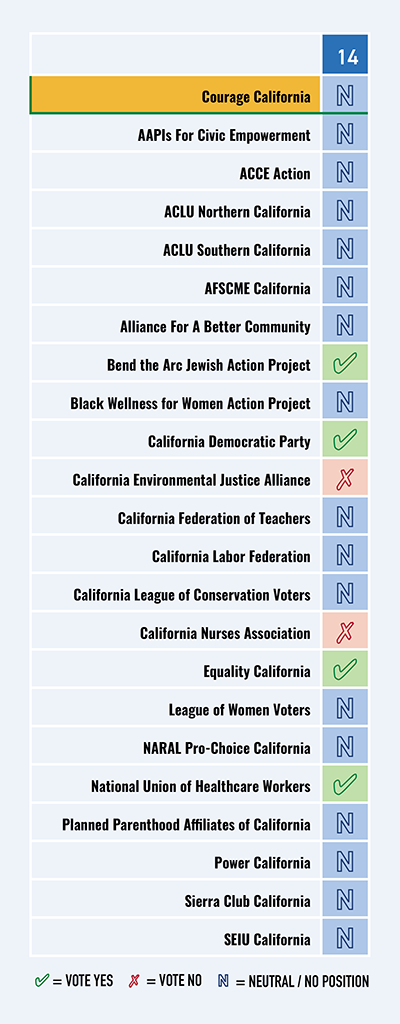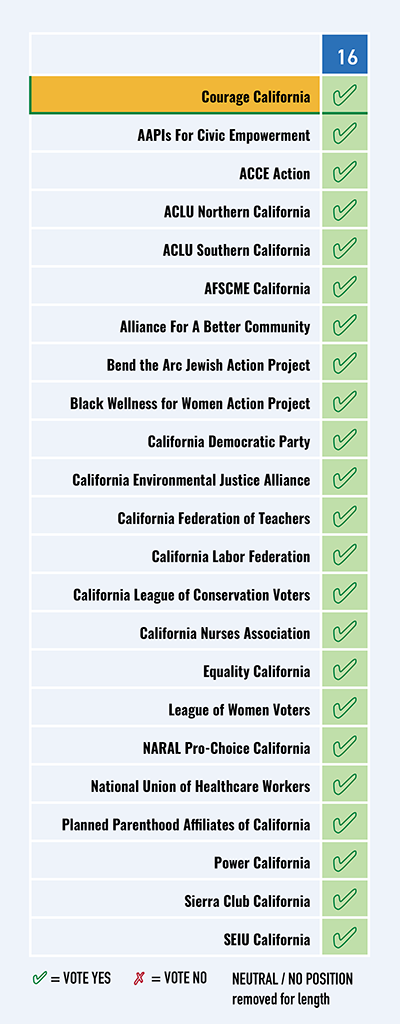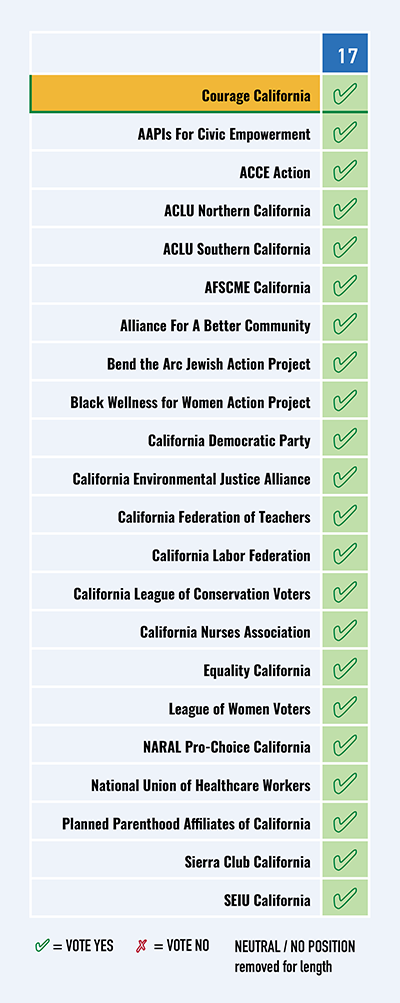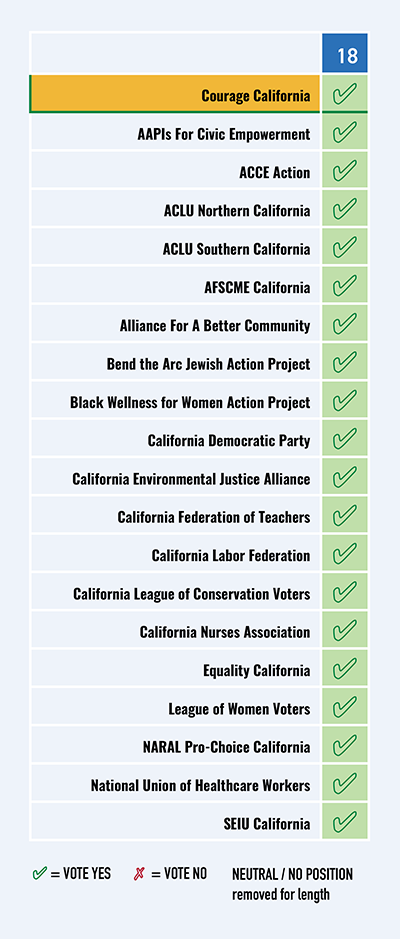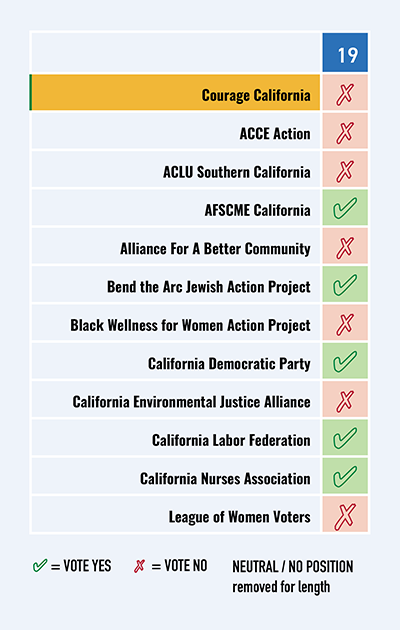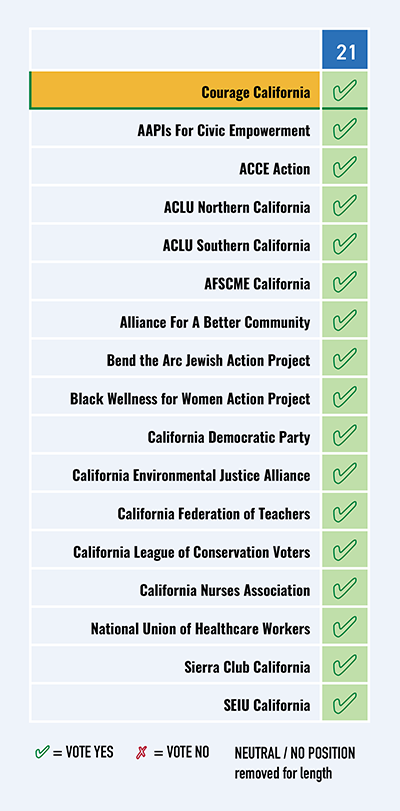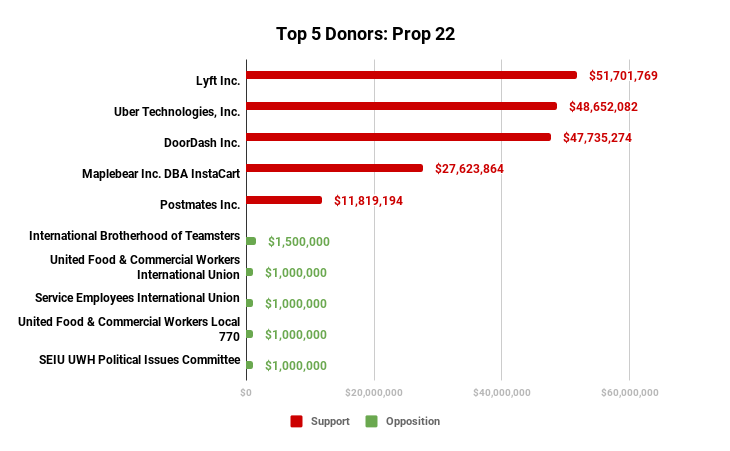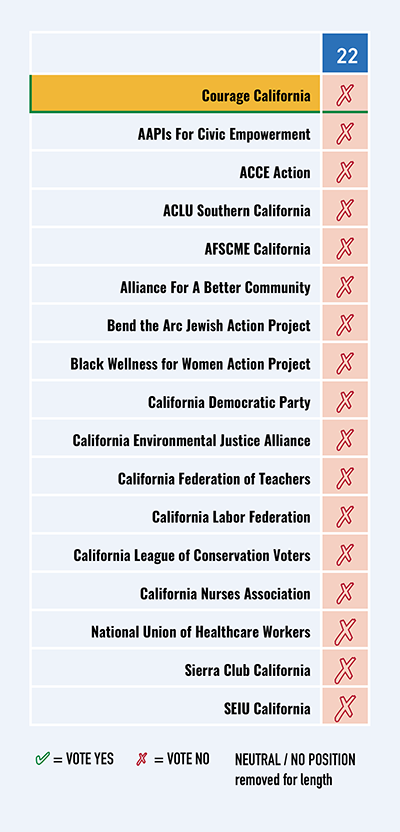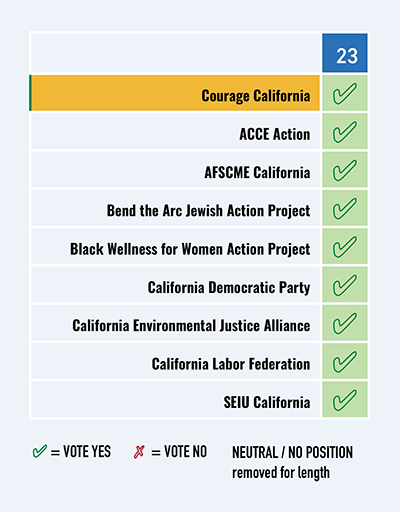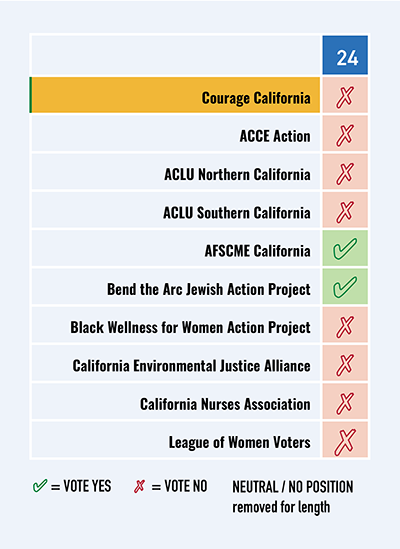Vote YES on Prop 25 to eliminate the use of cash bail in pretrial incarceration.
Proposition 25 is a referendum, which asks voters to directly weigh in on whether to keep or reject SB 10, a bill originally passed in 2018. Voting YES on Prop 25 will keep SB 10 in place and eliminate the cash bail system of pretrial incarceration in California, which is directly responsible for the disproportionate incarceration of Californians who cannot afford bail. The bail bond industry is directly responsible for placing Prop 25 on the ballot and calling SB 10 into question.
Why voting YES on Prop 25 Matters
- Nearly two-thirds of the jail population—nearly 48,000 people—are incarcerated pretrial, and California’s average bail is $50,000, more than five times the national average. The cash bail system directly ties an individual’s wealth and ability to pay to the question of whether they pose a risk to the community and their conditions of pretrial release. This system is unfair from every angle and perpetuates the cycle of poverty and incarceration existing in many low-income communities, which are also disproportionately Black and brown communities.
- In New Jersey, where similar legislation passed eliminating the use of cash bail in 2017, overall pretrial incarceration rates have dropped, racial disparities in pretrial incarceration rates have lessened, and the use of invasive monitoring strategies after release have been applied in far fewer eligible cases (8.3 percent) than feared. California’s SB 10 goes further than New Jersey’s legislation by fully eliminating the cash bail system and has the potential to have even more positive outcomes.
- The bail bond industry uses its influence to lobby for legislation favorable to them, which perpetuates but also escalates the cycle of poverty and incarceration. Passing Prop 25 will permanently end their influence in the political process.
- If Prop 25 does not pass, voters will be perceived as having rejected SB 10’s reforms, in particular the effort to end the cash bail system. This will be framed as a significant precedent for opponents of criminal-justice reform to use in lobbying and legal arguments to keep the system intact in the future.
- If Prop 25 passes, community groups will have the opportunity to advance further criminal-justice reforms related to this initiative.
Special Circumstances Surrounding Prop 25
- Originally, there was unanimous support for SB 10 from most criminal-justice reform groups across the state. The process of making amendments to the legislation caused many groups to drop their support. In our research, we discovered that the legislative decision-making process around SB 10 was strongly influenced by applied political pressure, resulting in a process and an outcome with less buy-in. Despite the widely acknowledged flaws in the overall process, a strong majority of Courage California's statewide progressive partners are aligned around a yes position on Prop 25.
- In a ruling in August 2020, the state Supreme Court issued a binding resolution in the case of In re Humphrey that orders all trial judges in the state of California to consider a person’s ability to pay in setting the cash bail amount for pretrial release. Grassroots groups objecting to Prop 25 argue that this ruling already creates systemic reform that will mitigate the impacts of the cash bail system, making SB 10 unnecessary. Advocates for Prop 25 contend that ending the cash bail system is an essential first step in eliminating the cycle of poverty and incarceration entirely.
- Organized opposition to Prop 25 from grassroots groups is strongest in Los Angeles County, where community leaders have been most successful in partnering with county officials to design and implement community-based alternatives to the incarceration system. In Los Angeles County, there are major concerns about how the implementation of a state-mandated pretrial incarceration program could interfere with their major strides in redressing the harms done to communities by an unfair justice system. These concerns are entirely valid, and attention will be focused on the actions of L.A. County’s Board of Supervisors to ensure that the alternatives to incarceration recommendations developed through a robust, community-driven dialogue process will continue to be implemented. The breakthroughs achieved by L.A. County’s criminal-justice reform movement have been characterized as historic and a model for other counties in California to follow, and this work must continue to move forward without delay.
Concerns About Prop 25
There are three major components to grassroots groups' objections to Prop 25. Here we provide our assessment of these concerns and how they can be addressed in the future if Prop 25 passes.
- Algorithm-based risk-assessment tools will be used as the core component of the new pretrial incarceration system in all California counties. There are concerns about how inherent biases in the system could influence the implementation of these tools. There are two notable countermeasures in place to address these concerns, and both are overseen by the Judicial Council, the policymaking body of the California court system.
- First, counties must validate the chosen risk-assessment tool for the communities in which it will be used. This is not a standardized approach to validation; the tool must be proven to provide a higher level of responsiveness and sensitivity to community conditions before it is implemented. The Judicial Council will have to certify each county's tool, and the tool must be revalidated for the communities it serves every three years.
- Second, counties are now required by law to track and publicly report how a defendant’s circumstances and background correspond to the decision a judge makes about their pretrial release conditions. This data has to be collected, compiled, and reported annually to the Judicial Council, as well as made publicly available for review. This law was passed the year after SB 10 to provide an avenue to monitor the implementation of SB 10, and is an important step in making risk-assessment tools more accountable and the overall pretrial incarceration system more transparent.
- The new pretrial incarceration system is directly implemented by the probation departments of each county in California. Probation departments are currently responsible for investigating offenders’ backgrounds, making sentencing recommendations to the court, enforcing court orders, and supervising sentenced offenders. They also recommend and collect restitution, oversee community service, and provide oversight of criminal-diversion programs. There are strong concerns about how probation departments will approach the oversight of people who have not been convicted of crimes. Probation supervision has been historically used for people who have been convicted and are released, and SB 10 expands that pool of people to those who are accused but not convicted. Probation violations are a primary driver of incarceration in LA, and in Sacramento under SB 10, initial data indicates that 30-40% of people released end up rearrested and 90%+ of those that are released have high conditions of release.
- We encourage counties to 1) require probation departments to work in partnership with other agencies, including the public defender’s office, mental-health services, and other community-based programs, in both implementing the risk-assessment system and in the pretrial release and monitoring of released individuals; 2) use their power to hold probation departments accountable for how they implement pretrial incarceration programs in communities with a particular focus on ensuring non-invasive monitoring, minimizing conditions of release, and maintaining a low rearrest rate ; and 3) invest in alternatives to the overall incarceration system, such as Measure J on the ballot in Los Angeles County, which amends the county charter to require that at least 10 percent of the county’s local revenues go to community-based programs, such as affordable housing and rent assistance, job training, and mental-health and social services.
- There are also concerns that judicial discretion is greatly expanded by SB 10. While this is technically true, there are two additional changes to the judicial role in the pretrial system that limit judicial discretion.
- First, anyone arrested with a misdemeanor, with some exceptions, is considered to not pose a significant risk to a community and is automatically released without going in front of a judge. This greatly reduces the overall role that a judge currently plays in the pretrial incarceration system.
- Second, while judges are not required to adhere by the risk scores findings in their determination of pretrial release or pretrial detention, this is not an expansion of judicial discretion from the current system. Instead, SB 10 simply gives judges additional information to inform their decision.
- Third, all judicial decisions are now required to be publicly recorded and therefore more transparent and available for public scrutiny. This is essential because judges now have increased discretion over the more serious felony cases, and they also have discretion to carve out other other exclusions from release for misdemeanors at the county-level. Under the new system, when a prosecutor exercises their option to seek detention, a judge must hold a hearing and make the findings available on record before they order the person detained pretrial. In the current cash bail system, judges can use their discretion to set cash bail at any number with no requirement to make any findings public, which effectively detains an individual with no judicial accountability. The new judicial transparency requirement makes it easier for an individual to appeal a judge’s preventative detention decision. This is a clear improvement over the lax requirements that existed before SB 10.
Misinformation About Prop 25
The bail bond industry has invested heavily in a No on the Prop 25 campaign in an attempt to spread misinformation and save the industry.
- “Prop 25 denies a U.S. constitutional right.” FALSE. The 8th Amendment to the U.S. Constitution prohibits the courts from imposing excessive bail. By eliminating the cash bail system, Prop 25 simply makes this prohibition irrelevant.
- “Prop 25 puts our public safety at risk.” FALSE. Judges will have increased judicial discretion over the more serious felony cases, which means defendants who may pose a threat to a community or specific individual will be given individual consideration. All decisions made by judges will also be required to be publicly recorded.
- “Prop 25 deprives justice for crime victims.” FALSE. In New Jersey, where similar legislation passed eliminating the use of cash bail in 2017, a recent study concluded that defendants are continuing to show up for court cases at the same rate and that people released under the new regulations are no more likely to commit a crime while waiting for trial than those released under the previous system on money bail.
- “Prop 25 creates additional biases against minorities and the poor.” FALSE. In New Jersey, similar legislation passed eliminating the use of cash bail has reduced racial disparities in the jail population. In California, new reporting requirements enable racial disparities to be systematically tracked for the first time. And ending cash bail immediately eliminates the most immediate factor in the criminal-justice system that drives the cycle of poverty and incarceration existing in many low-income communities, which are also disproportionately Black and brown communities.
Top Funders of Prop 25
- The two largest donors in support of Prop 25 are Connie and Steve Ballmer. Steve Ballmer is the former CEO of Microsoft and current owner of the L.A. Clippers team. The Ballmers are philanthropists who have given over $300 million to 70 nonprofits over the last three years for gun safety and racial justice. They have also pledged $25 million in coronavirus aid. In a statement, they said that “far too many people that are not a danger are getting stuck in jail waiting for their trials simply because they can’t afford bail.”
- The next largest donor is John Arnold of Arnold Ventures and the Laura and John Arnold Foundation. Arnold’s foundation created an algorithm-based pretrial risk-assessment tool called the Public Safety Assessment (PSA) that is currently used in 30 different counties including San Francisco, Santa Cruz, and Tulare counties in California. The foundation has also created several think tank projects including the National Partnership for Pretrial Justice and Advancing Pretrial Policy and Research, which produce research, policy advocacy, and implementation support for the PSA specifically and more generally for the process of replacing cash bail with pretrial risk assessments. Arnold has been sued for a judge’s use of PSA resulting in a murder by the released suspect. In our research, we did not find a connection between Arnold and any of the three pre-trial assessment service providers that have been approved for use under SB 10, which are Journal Technologies Inc., FivePoint Solutions, and Equivant. It is also unclear if the PSA will continue to be used in California counties under SB 10. Arnold is a former hedge fund manager and was involved in the Enron scandal in which he walked away with an $8 million bonus.
- The other three top donors in support of Prop 25 are SEIU California State Council; Action Now Initiative, LLC; and philanthropist Patty Quillin.
- The top donor in opposition to Prop 25 is Triton Management Services, LLC, the parent company of Aladdin Bail Bonds.
- The American Bail Coalition, consisting of several insurance and bail companies, is opposed to Prop 25, as it wants the bail system to remain in place to avoid going out of business.
Progressive Landscape

Vote YES on Prop 25 to eliminate the use of cash bail in pretrial incarceration.
Proposition 25 is a referendum, which asks voters to directly weigh in on whether to keep or reject SB 10, a bill originally passed in 2018. Voting YES on Prop 25 will keep SB 10 in place and eliminate the cash bail system of pretrial incarceration in California, which is directly responsible for the disproportionate incarceration of Californians who cannot afford bail. The bail bond industry is directly responsible for placing Prop 25 on the ballot and calling SB 10 into question.
Why voting YES on Prop 25 Matters
- Nearly two-thirds of the jail population—nearly 48,000 people—are incarcerated pretrial, and California’s average bail is $50,000, more than five times the national average. The cash bail system directly ties an individual’s wealth and ability to pay to the question of whether they pose a risk to the community and their conditions of pretrial release. This system is unfair from every angle and perpetuates the cycle of poverty and incarceration existing in many low-income communities, which are also disproportionately Black and brown communities.
- In New Jersey, where similar legislation passed eliminating the use of cash bail in 2017, overall pretrial incarceration rates have dropped, racial disparities in pretrial incarceration rates have lessened, and the use of invasive monitoring strategies after release have been applied in far fewer eligible cases (8.3 percent) than feared. California’s SB 10 goes further than New Jersey’s legislation by fully eliminating the cash bail system and has the potential to have even more positive outcomes.
- The bail bond industry uses its influence to lobby for legislation favorable to them, which perpetuates but also escalates the cycle of poverty and incarceration. Passing Prop 25 will permanently end their influence in the political process.
- If Prop 25 does not pass, voters will be perceived as having rejected SB 10’s reforms, in particular the effort to end the cash bail system. This will be framed as a significant precedent for opponents of criminal-justice reform to use in lobbying and legal arguments to keep the system intact in the future.
- If Prop 25 passes, community groups will have the opportunity to advance further criminal-justice reforms related to this initiative.
Special Circumstances Surrounding Prop 25
- Originally, there was unanimous support for SB 10 from most criminal-justice reform groups across the state. The process of making amendments to the legislation caused many groups to drop their support. In our research, we discovered that the legislative decision-making process around SB 10 was strongly influenced by applied political pressure, resulting in a process and an outcome with less buy-in. Despite the widely acknowledged flaws in the overall process, a strong majority of Courage California's statewide progressive partners are aligned around a yes position on Prop 25.
- In a ruling in August 2020, the state Supreme Court issued a binding resolution in the case of In re Humphrey that orders all trial judges in the state of California to consider a person’s ability to pay in setting the cash bail amount for pretrial release. Grassroots groups objecting to Prop 25 argue that this ruling already creates systemic reform that will mitigate the impacts of the cash bail system, making SB 10 unnecessary. Advocates for Prop 25 contend that ending the cash bail system is an essential first step in eliminating the cycle of poverty and incarceration entirely.
- Organized opposition to Prop 25 from grassroots groups is strongest in Los Angeles County, where community leaders have been most successful in partnering with county officials to design and implement community-based alternatives to the incarceration system. In Los Angeles County, there are major concerns about how the implementation of a state-mandated pretrial incarceration program could interfere with their major strides in redressing the harms done to communities by an unfair justice system. These concerns are entirely valid, and attention will be focused on the actions of L.A. County’s Board of Supervisors to ensure that the alternatives to incarceration recommendations developed through a robust, community-driven dialogue process will continue to be implemented. The breakthroughs achieved by L.A. County’s criminal-justice reform movement have been characterized as historic and a model for other counties in California to follow, and this work must continue to move forward without delay.
Concerns About Prop 25
There are three major components to grassroots groups' objections to Prop 25. Here we provide our assessment of these concerns and how they can be addressed in the future if Prop 25 passes.
- Algorithm-based risk-assessment tools will be used as the core component of the new pretrial incarceration system in all California counties. There are concerns about how inherent biases in the system could influence the implementation of these tools. There are two notable countermeasures in place to address these concerns, and both are overseen by the Judicial Council, the policymaking body of the California court system.
- First, counties must validate the chosen risk-assessment tool for the communities in which it will be used. This is not a standardized approach to validation; the tool must be proven to provide a higher level of responsiveness and sensitivity to community conditions before it is implemented. The Judicial Council will have to certify each county's tool, and the tool must be revalidated for the communities it serves every three years.
- Second, counties are now required by law to track and publicly report how a defendant’s circumstances and background correspond to the decision a judge makes about their pretrial release conditions. This data has to be collected, compiled, and reported annually to the Judicial Council, as well as made publicly available for review. This law was passed the year after SB 10 to provide an avenue to monitor the implementation of SB 10, and is an important step in making risk-assessment tools more accountable and the overall pretrial incarceration system more transparent.
- The new pretrial incarceration system is directly implemented by the probation departments of each county in California. Probation departments are currently responsible for investigating offenders’ backgrounds, making sentencing recommendations to the court, enforcing court orders, and supervising sentenced offenders. They also recommend and collect restitution, oversee community service, and provide oversight of criminal-diversion programs. There are strong concerns about how probation departments will approach the oversight of people who have not been convicted of crimes. Probation supervision has been historically used for people who have been convicted and are released, and SB 10 expands that pool of people to those who are accused but not convicted. Probation violations are a primary driver of incarceration in LA, and in Sacramento under SB 10, initial data indicates that 30-40% of people released end up rearrested and 90%+ of those that are released have high conditions of release.
- We encourage counties to 1) require probation departments to work in partnership with other agencies, including the public defender’s office, mental-health services, and other community-based programs, in both implementing the risk-assessment system and in the pretrial release and monitoring of released individuals; 2) use their power to hold probation departments accountable for how they implement pretrial incarceration programs in communities with a particular focus on ensuring non-invasive monitoring, minimizing conditions of release, and maintaining a low rearrest rate ; and 3) invest in alternatives to the overall incarceration system, such as Measure J on the ballot in Los Angeles County, which amends the county charter to require that at least 10 percent of the county’s local revenues go to community-based programs, such as affordable housing and rent assistance, job training, and mental-health and social services.
- There are also concerns that judicial discretion is greatly expanded by SB 10. While this is technically true, there are two additional changes to the judicial role in the pretrial system that limit judicial discretion.
- First, anyone arrested with a misdemeanor, with some exceptions, is considered to not pose a significant risk to a community and is automatically released without going in front of a judge. This greatly reduces the overall role that a judge currently plays in the pretrial incarceration system.
- Second, while judges are not required to adhere by the risk scores findings in their determination of pretrial release or pretrial detention, this is not an expansion of judicial discretion from the current system. Instead, SB 10 simply gives judges additional information to inform their decision.
- Third, all judicial decisions are now required to be publicly recorded and therefore more transparent and available for public scrutiny. This is essential because judges now have increased discretion over the more serious felony cases, and they also have discretion to carve out other other exclusions from release for misdemeanors at the county-level. Under the new system, when a prosecutor exercises their option to seek detention, a judge must hold a hearing and make the findings available on record before they order the person detained pretrial. In the current cash bail system, judges can use their discretion to set cash bail at any number with no requirement to make any findings public, which effectively detains an individual with no judicial accountability. The new judicial transparency requirement makes it easier for an individual to appeal a judge’s preventative detention decision. This is a clear improvement over the lax requirements that existed before SB 10.
Misinformation About Prop 25
The bail bond industry has invested heavily in a No on the Prop 25 campaign in an attempt to spread misinformation and save the industry.
- “Prop 25 denies a U.S. constitutional right.” FALSE. The 8th Amendment to the U.S. Constitution prohibits the courts from imposing excessive bail. By eliminating the cash bail system, Prop 25 simply makes this prohibition irrelevant.
- “Prop 25 puts our public safety at risk.” FALSE. Judges will have increased judicial discretion over the more serious felony cases, which means defendants who may pose a threat to a community or specific individual will be given individual consideration. All decisions made by judges will also be required to be publicly recorded.
- “Prop 25 deprives justice for crime victims.” FALSE. In New Jersey, where similar legislation passed eliminating the use of cash bail in 2017, a recent study concluded that defendants are continuing to show up for court cases at the same rate and that people released under the new regulations are no more likely to commit a crime while waiting for trial than those released under the previous system on money bail.
- “Prop 25 creates additional biases against minorities and the poor.” FALSE. In New Jersey, similar legislation passed eliminating the use of cash bail has reduced racial disparities in the jail population. In California, new reporting requirements enable racial disparities to be systematically tracked for the first time. And ending cash bail immediately eliminates the most immediate factor in the criminal-justice system that drives the cycle of poverty and incarceration existing in many low-income communities, which are also disproportionately Black and brown communities.
Top Funders of Prop 25
- The two largest donors in support of Prop 25 are Connie and Steve Ballmer. Steve Ballmer is the former CEO of Microsoft and current owner of the L.A. Clippers team. The Ballmers are philanthropists who have given over $300 million to 70 nonprofits over the last three years for gun safety and racial justice. They have also pledged $25 million in coronavirus aid. In a statement, they said that “far too many people that are not a danger are getting stuck in jail waiting for their trials simply because they can’t afford bail.”
- The next largest donor is John Arnold of Arnold Ventures and the Laura and John Arnold Foundation. Arnold’s foundation created an algorithm-based pretrial risk-assessment tool called the Public Safety Assessment (PSA) that is currently used in 30 different counties including San Francisco, Santa Cruz, and Tulare counties in California. The foundation has also created several think tank projects including the National Partnership for Pretrial Justice and Advancing Pretrial Policy and Research, which produce research, policy advocacy, and implementation support for the PSA specifically and more generally for the process of replacing cash bail with pretrial risk assessments. Arnold has been sued for a judge’s use of PSA resulting in a murder by the released suspect. In our research, we did not find a connection between Arnold and any of the three pre-trial assessment service providers that have been approved for use under SB 10, which are Journal Technologies Inc., FivePoint Solutions, and Equivant. It is also unclear if the PSA will continue to be used in California counties under SB 10. Arnold is a former hedge fund manager and was involved in the Enron scandal in which he walked away with an $8 million bonus.
- The other three top donors in support of Prop 25 are SEIU California State Council; Action Now Initiative, LLC; and philanthropist Patty Quillin.
- The top donor in opposition to Prop 25 is Triton Management Services, LLC, the parent company of Aladdin Bail Bonds.
- The American Bail Coalition, consisting of several insurance and bail companies, is opposed to Prop 25, as it wants the bail system to remain in place to avoid going out of business.
Progressive Landscape



